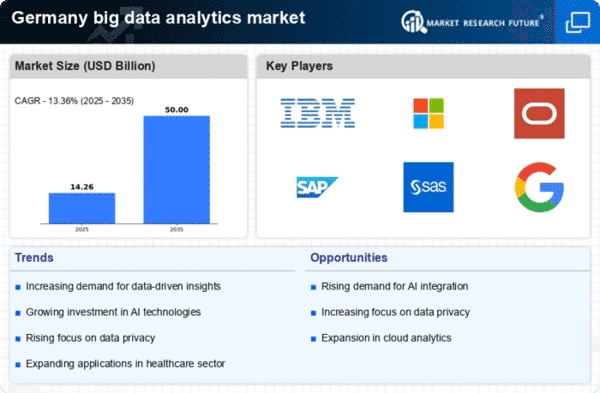Investment in Data Infrastructure
The big data-analytics market in Germany is benefiting from substantial investments in data infrastructure. Companies are recognizing the necessity of robust data management systems to support their analytics initiatives. Recent data suggests that investments in data infrastructure are projected to grow by 25% annually, as organizations aim to enhance their data storage, processing, and security capabilities. This trend is particularly evident in sectors such as finance and healthcare, where data integrity and accessibility are paramount. As businesses upgrade their data infrastructure, the demand for advanced analytics solutions is likely to increase, thereby driving growth in the big data-analytics market.
Rising Demand for Real-Time Analytics
The big data analytics market in Germany is experiencing a notable surge in demand for real-time analytics solutions. Businesses are increasingly recognizing the value of immediate insights derived from data, which can enhance decision-making processes. According to recent studies, approximately 60% of organizations in Germany are prioritizing real-time data capabilities to improve operational efficiency. This trend is driven by the need for timely responses to market changes and customer preferences. As a result, companies are investing in advanced analytics tools that facilitate real-time data processing and visualization. The growing reliance on real-time analytics is likely to propel the big data-analytics market forward, as organizations seek to leverage data for competitive advantage.
Expansion of Data-Driven Decision Making
In Germany, there is a significant shift towards data-driven decision-making across various sectors, which is positively impacting the big data-analytics market. Organizations are increasingly utilizing data analytics to inform strategic choices, optimize operations, and enhance customer experiences. Reports indicate that around 70% of German companies are integrating data analytics into their decision-making frameworks. This expansion is fostering a culture of evidence-based management, where insights derived from data analytics are prioritized over intuition. Consequently, the demand for sophisticated analytics tools and platforms is expected to rise, further stimulating growth in the big data-analytics market.
Focus on Enhanced Data Security Measures
In the context of the big data-analytics market, there is a heightened focus on enhancing data security measures among organizations in Germany. With the increasing volume of data being generated, concerns regarding data breaches and privacy violations are becoming more pronounced. Recent surveys indicate that over 80% of German companies are prioritizing investments in data security technologies to protect sensitive information. This emphasis on security is driving the development of advanced analytics solutions that incorporate robust security features. As organizations strive to comply with stringent data protection regulations, the demand for secure analytics platforms is expected to rise, thereby contributing to the growth of the big data-analytics market.
Emergence of Industry-Specific Analytics Solutions
The big data-analytics market in Germany is witnessing the emergence of industry-specific analytics solutions tailored to meet the unique needs of various sectors. Industries such as manufacturing, retail, and healthcare are increasingly adopting specialized analytics tools that address their specific challenges. For instance, the manufacturing sector is leveraging predictive analytics to optimize supply chain operations, while the retail industry is utilizing customer analytics to enhance personalization. This trend indicates a growing recognition of the importance of customized analytics solutions, which could potentially lead to a 30% increase in market demand for specialized tools. As organizations seek to derive more value from their data, the big data-analytics market is likely to expand.
















